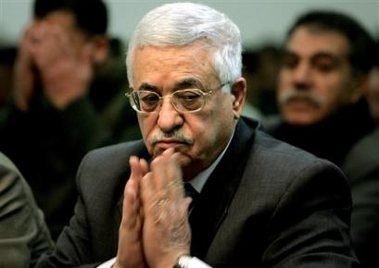Several Fatah officials called
on President Mahmoud Abbas to resign and dissolve the Palestinian Authority to
protest Israel's raid of a West Bank prison earlier this week, party activists
said Friday.
The raid, in which Israel seized six top militants, was seen as a humiliating
blow to Abbas' prestige and raised new questions in his Fatah Party about their
president's ability to govern, especially following Hamas' landslide victory in
a January parliamentary election.

Palestinian
Authority President Mahmoud Abbas, also known as Abu Mazen, attends Muslim
Friday noon prayers at a mosque adjacent to his offices in the West Bank
town of Ramallah, March 17, 2006. Following Hamas' election, Israel
declared it would have nothing to do with a government that incorporated
the militant group. Israel has rejected Abbas' offer to continue
negotiations under the auspices of the Palestine Liberation Organization,
which he heads, saying Abbas is part and parcel of a terrorist government
even though he doesn't belong to Hamas and holds more moderate views.
[AP] |
If the Palestinian Authority is dissolved, Israel — as occupier of the West
Bank and Gaza Strip — would be forced to assume responsibility for the 3 million
Palestinians living there. The dissolution also would render Hamas' election
victory irrelevant.
In violence Friday, Israeli soldiers shot and killed a 10-year-old girl
during an operation in the West Bank village of Yamoun, the girl's father, Abdul
Rahman Zaed, said. The girl was in a car with her uncle, who was shot in the
head and arrested, Zaed said.
The army, engaged in a fierce gunbattle with militants in Yamoun, surrounded
a house in which three militants were holed up and called on them to surrender,
Palestinian security officials said. Later, a 13-year-old boy was wounded in the
fighting, officials said.
The call for Abbas' resignation and the dissolution of the Palestinian
Authority at the Fatah Central Committee late Thursday was the first time such a
demand was made.
Analysts and Fatah officials said the demands — raised both in a letter to
Abbas signed by five midlevel Fatah activists and at Thursday's meeting by a
senior party official — are not serious at the moment.
However, the idea could gain momentum if a resumption of peace talks becomes
increasingly unlikely and the economic situation deteriorates further, said
Ghassan Khatib, the outgoing Palestinian planning minister.
Taysir Nasrallah, a Fatah official from the West Bank city of Nablus who
signed the letter, said Israel's prison raid showed the Palestinian Authority
was useless.
"Israel should pay a heavy price for occupying the Palestinian Authority,"
Nasrallah told The Associated Press.
In Thursday's meeting of Fatah's Central Committee, one of the members, Tayeb
Abdel Rahim, opened the session by demanding that Abbas resign and dissolve the
Palestinian Authority, a participant said. He spoke on condition of anonymity
because he was not authorized to talk to the media about the closed-door
session.
The official quoted Abdel Rahim as saying that the Palestinian Authority is
unable to solve Palestinian problems and that it is "time for us to leave."
During a tour of the demolished prison in Jericho a day after Israel's raid,
Abbas rejected the idea that he would resign and dissolve the Palestinian
Authority.
Fatah has been increasingly frustrated with Abbas since Hamas' election
victory, and the party is almost certainly not joining the Islamic group's new
government.
Abbas is tentatively scheduled to meet Hamas' designated prime minister,
Ismail Haniyeh, on Saturday.
Hamas spokesman Salah Bardawil said the group would be ready to present its
government to Abbas on Saturday. Abbas has the power to veto Hamas' government,
forcing it to return with a different program.
Since Hamas' election victory, Israel has tightened its hold on the
Palestinians.
It has stopped transferring millions of dollars in tax revenues collected for
the Palestinian Authority and has called on the international community to slap
economic sanctions on a Hamas government, steps the World Bank says would
devastate the already poverty-ridden Palestinian areas.
A closure on Palestinian areas, meant to end Thursday after the Jewish
holiday of Purim, has been extended until at least next week, and the army is
inclined to continue it until after Israel's March 28 elections.
The closure bars Palestinian laborers from entering Israel and shuts down
Gaza's main cargo crossing, Karni. Israel, citing security concerns, has closed
Karni on and off for most of the past two months.
Karni's closure led the Palestinian Mill Co., which says it supplies about 60
percent of Gaza's flour, to idle last week because it used up its flour stocks.
On Friday, Palestinians flocked to bakeries in Gaza City, fearing a bread
shortage.
The Palestinian National Economy Ministry said Friday it expects bakeries to
run out of flour within a few days because of the mill's shutdown.
Also Friday, two Palestinians were killed and three wounded in northern Gaza
when homemade rockets they were preparing to fire at Israel exploded
prematurely, Palestinian security officials said.